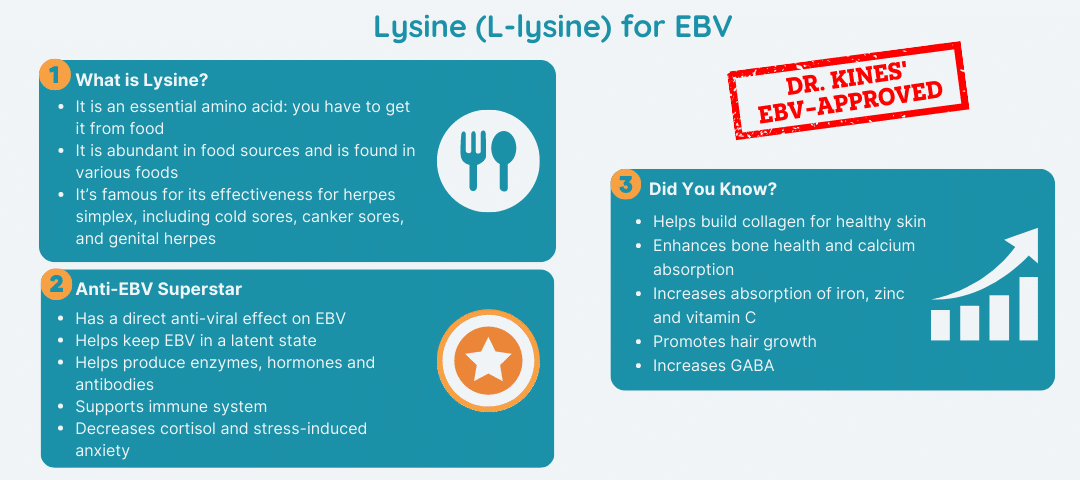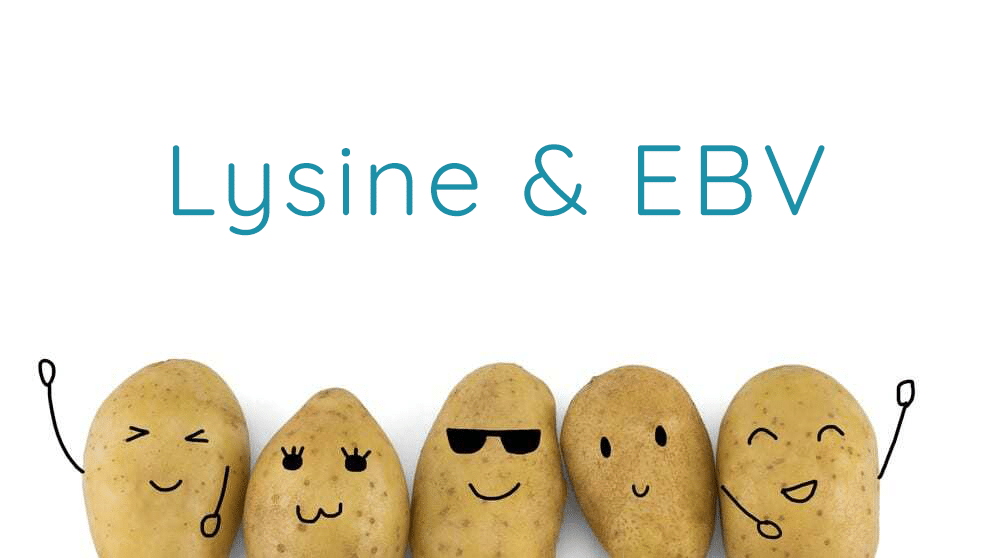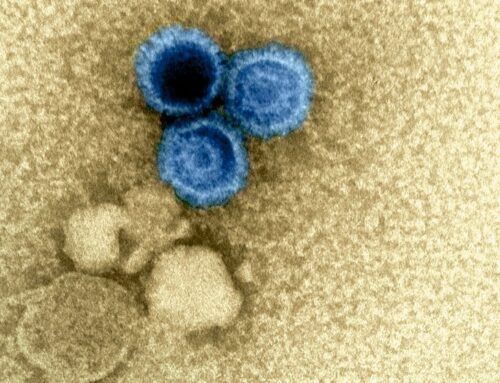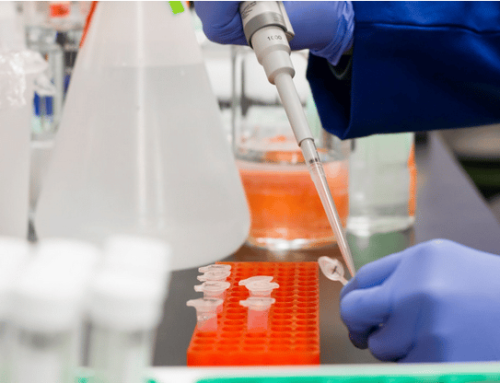Lysine is one of the best supplements for people with Epstein-Barr Virus. Let’s discuss the remarkable qualities and benefits of this little-appreciated nutrient.
Scientific Highlights of What Lysine Can Do for Your EBV
Lysine: food sources and daily needs
Lysine is an essential amino-acid:
Lysine is an amino acid, a building block of protein. It is also an essential amino acid, which means that our body cannot make it itself – that we have to get it from foods. Luckily, lysine is abundant in foods.
Food sources of lysine:
Here are lysine-rich foods: from meat, dairy and seafood to beans and legumes, to vegetables like beets, leeks, tomatoes, bell peppers, potatoes or avocados to fruits like dried apricots, mangos, pears, nuts like pumpkin seeds pistachios, cashews, macadamia nuts, and grains like quinoa, amaranth and buckwheat.
Unfortunately, in acute or chronic EBV, diet is not a match for the antiviral support we need from lysine and turning to daily lysine supplementation is important.
How much lysine do we need in general?
Typical dietary guideline for lysine is 1000mg a day for a healthy person, but it depends on weight, and if you want to be exact, count 14 mg of lysine per pound of body weight, so if you weigh 150 pounds, you need about 2100 mg lysine (Daniel et al., 2007). We will discuss therapeutic supplementation with lysine further in this blog.
Lysine: antiviral benefits for EBV
Lysine is directly antiviral and that includes EBV and other herpes viruses. In fact, lysine is one of the most effective antiviral supplements for herpes simplex, including cold sores, canker sores, and genital herpes (Walsh et al., 1983). I’ve seen it resolve herpes simplex symptoms in as little as 20 minutes.
While lysine has a great anti-EBV reputation, and I can confirm that from my clinical experience, we need more studies specific to EBV. One of the few studies I found suggests that a lysine-containing complex, histone H3 lysine 9 methyltransferase Suv39 h1, helps maintain EBV latency (Imai et al., 2013). Latency means being dormant, between reactivations.
Lysine versus Arginine Debate and EBV
Lysine competes with arginine, an amino-acid that is conditionally essential. Conditionally essential means that depending on circumstances, the body may or may not be able to make it.
Arginine is required for many viruses to replicate, including EBV. Therefore, it is believed that limiting foods high in arginine is necessary for a person with EBV.
Food sources high in arginine often also contain good levels of lysine, making things more complicated for food purists. While you may be tempted to eliminate whole groups of foods to avoid arginine, I would much rather secure a therapeutic daily dose of lysine supplementation because eliminating an entire food group can eventually lead to nutritional deficiencies. Also, be aware of the quantity of arginine you consume: seafoods, pork and turkey are high in arginine, so perhaps do not consume them as often or enjoy them in smaller quantities. Nuts and peanuts contain quite a lot of arginine, so use them as snacks, but do not over consume them as if they were meals (something that many people actually do!).
Arginine and Citrulination
What is worse is that EBV can citrullinate arginine, which means that the virus changes the structure of arginine (the amino acid sequence) into citrulline. The process of citrullination has been linked to autoimmune disorders like rheumatoid arthritis, multiple sclerosis, psoriasis, Alzheimer’s disease and even cancer (Citrullination, 2014). For example, medical doctors already test for citrullinated antibodies when looking for early stages of rheumatoid arthritis (Pratesi et al., 2021). EBV is the only virus, according to my conversation with Dr. Aristo Vojdani, PhD, that citrullinates arginine.
The solution really is having a therapeutic and predictable level of supplemental lysine to help turn down the virus.

Other Benefits of Lysine
Lysine has an impressive list of health benefits that extend far beyond EBV that are worth mentioning and not well known.
Bones
Lysine promotes improved bone strength, increases calcium absorption and hence can help prevent osteoporosis.
Nutrient Absorption and Hair
Lysine increases absorption of iron, zinc and Vitamin C. It can help reduce hair loss and promote hair growth – it improves absorption of iron, needed for hemoglobin. Hemoglobin then carries oxygen to the hair molecule.
Collagen
Lysine increases collagen production, especially on the skin (along with Vitamin C). While collagen in supplements is not well utilized by the body, a combination of lysine and Vitamin C can step in to support your collagen needs.
Support of Various Functions
Lysine increases growth hormone (muscle support), helps produce enzymes, antibodies and hormones, and supports the immune system
Brain and Mood
Lysine reduces stress-induced anxiety – it decreases the brain-gut response to stress as well as decreasing blood cortisol levels (Smriga, 2003). It can improve symptoms of depression by increasing serotonin levels in the brain. Lysine can also increase GABA, a neurotransmitter made in the brain that makes us feel really relaxed. Finally, lysine can even be helpful in schizophrenia (Zeinoddini et al., 2014).
Lysine Dosage for EBV
Lysine comes in 500 mg increments per capsule. It is generally safe to use an acute dose of 1000 mg 2 or 3 times a day. Lysine is an amino acid and as such should be taken between meals. In studies, it has been used safely at the dose of 1000 mg daily in up to two divided doses for up to 12 months, or 1000 mg taken three times daily for 6 months. There is flexibility with dosing of lysine, so you can start where you feel comfortable.
Here is the product I recommend in our EBV community. Enjoy the 10% savings with the coupon code EBVHEROES10. Also, enjoy the video training and the infographic I have put together for you on this product page.
Lysine Alerts, Toxicity, and Special Cases
- Toxic levels of lysine can cause diarrhea, nausea, abdominal pain, gallstones, and kidney dysfunction.
- Do not use lysine if you have hemochromatosis because it enhances iron and Vitamin C absorption. For the same reason, it is beneficial if you have iron deficiency.
- High doses of lysine long term can increase cholesterol and increase risk of gallstones, at least according to animal studies, so if you already have either, make sure your dose is more conservative. Even 1 capsule a day can be of benefit. An important note here is that high cholesterol can be actually caused by EBV itself. Other than diet or genetics, an autoimmune condition called Hashimoto’s as well as hypothyroidism can both lead to elevated cholesterol.
- High doses of lysine shouldn’t be taken with compromised kidneys or with aminoglycoside antibiotics (gentamicin, neomycin, streptomycin, etc.) due to risk of nephrotoxicity (toxic kidney).
- Long-term excessive consumption of lysine may also increase the risk of Fanconi syndrome, a condition wherein nutrients normally absorbed into the bloodstream are excreted as urine instead. There is only one case reported of a 44-year old woman who was taking 3000 mg lysine for 5 years, developed this condition and eventually also chronic renal failure (Lo et l., 1996). YOU DO NOT WANT TO TAKE THIS DOSE FOR YEARS. We are talking about months only.
- When you start feeling better, decrease the dose to 500 mg once or twice a day.
- Lysine while pregnant: lysine is one of the few supplements that is generally safe to take during pregnancy, but please discuss that and appropriate dosing of it with your doctor before starting this supplement if you are pregnant.
Summary: When NOT to Use Lysine
- Don’t take lysine if you have gallstones
- Don’t take lysine if you have hemochromatosis
- Don’t take lysine if you have kidney disease or any kidney impairment
- Don’t take lysine if you have high cholesterol
- If unsure, ask your doctor or pharmacist
Moving Forward
Some of my clients can pinpoint the right dose of lysine quite fast: if they remove it or decrease the dose too much, they experience EBV symptoms, and when they reintroduce a higher dose, they feel better. You need to find out the right maximum safe dose for you. But, eventually, definitely after 6 months, you should not need 3000 mg a day. In order to help a person heal from chronic EBV though, lysine should be part of a broader anti-EBV protocol.
Disclaimer
I am not a medical doctor and do not claim to cure or treat any disease. All information in this blog is educational only. It is your responsibility to ensure it is safe to take any supplement discussed. Do not discontinue any medication. Do not take any supplement discussed if pregnant or breast-feeding. Discuss all supplements with your pharmacist or your doctor.
References:
Citrullination: taking the charge out of Arg. (2014). Cytosceleton News. Retrieved from http://www.cytoskeleton.com/pdf-storage/news/citrullination-news.pdf
(Daniel et al., 2007) Lysine Requirement through the Human Life Cycle.
Imai, K., Kamio, N., Cueno, M. E., Saito, Y., Inoue, H., Saito, I., & Ochiai, K. (2014). Role of the histone H3 lysine 9 methyltransferase Suv39 h1 in maintaining Epsteinn-Barr virus latency in B95-8 cells. FEBS J, 281(9), 2148-2158
Pratesi, F., Tommasi, C., Anzilotti, C., Puxeddu, I., Sardano, E., Di Colo, G., & Migliorini, P. (2011). Antibodies to a new viral citrullinated peptide, VCP2: fine specificity and correlation with anti-cyclic citrullinated peptide (CCP) and anti-VCP1 antibodies. Clin Exp Immunol, 164(3), 337-345. doi:10.1111/j.1365-2249.2011.04378.x
Smriga, M., & Torii, K. (2003). L-Lysine acts like a partial serotonin receptor 4 antagonist and inhibits serotonin-mediated intestinal pathologies and anxiety in rats. Proc Natl Acad Sci U S A, 100(26), 15370-15375.
Walsh, D. E., Griffith, R. S., & Behforooz, A. (1983). Subjective response to lysine in the therapy of herpes simplex. J Antimicrob Chemother, 12(5), 489-496.
Zeinoddini, A., Ahadi, M., Farokhnia, M., Rezaei, F., Tabrizi, M., & Akhondzadeh, S. (2014). L-lysine as an adjunct to risperidone in patients with chronic schizophrenia: a double-blind, placebo-controlled, randomized trial. J Psychiatr Res, 59, 125-131.
(Lo et al., 1996) Fanconi’s syndrome and tubulointerstitial nephritis in association with L-lysine ingestion.








Leave A Comment